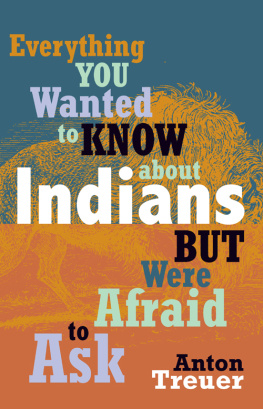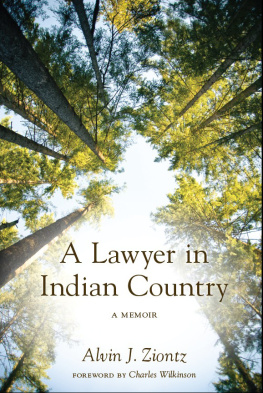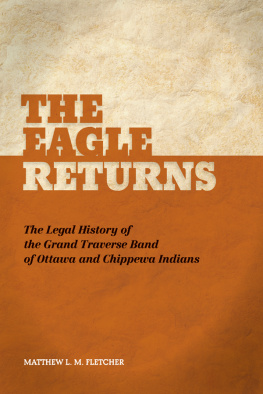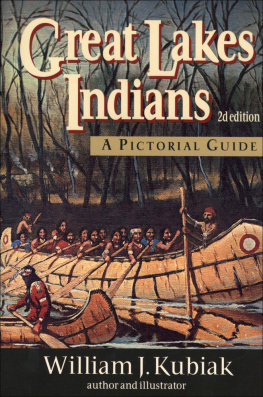Everything You Wanted
to Know about Indians
Everything
You Wanted
to Know about
INDIANS
But Were Afraid to Ask
Anton Treuer

Borealis Books is an imprint of the Minnesota Historical Society Press.
www.mhspress.org
2012 by the Minnesota Historical Society. All rights reserved. No part of this book may be used or reproduced in any manner whatsoever without written permission, except in the case of brief quotations embodied in critical articles and reviews. For information, write to Borealis Books, 345 Kellogg Blvd. W., St. Paul, MN 55102-1906.
The Minnesota Historical Society Press is a member of the Association of American University Presses.
Manufactured in the United States of America
10 9 8 7 6 5 4 3 2 1
 The paper used in this publication meets the minimum requirements of the American National Standard for Information SciencesPermanence for Printed Library Materials, ANSI Z39.481984.
The paper used in this publication meets the minimum requirements of the American National Standard for Information SciencesPermanence for Printed Library Materials, ANSI Z39.481984.
International Standard Book Number
ISBN: 978-0-87351-861-1 (paper)
ISBN: 978-0-87351-862-8 (e-book)
Library of Congress Cataloging-in-Publication Data
Treuer, Anton.
Everything you wanted to know about Indians but were afraid to ask / Anton Treuer.
p. cm.
Includes bibliographical references.
ISBN 978-0-87351-861-1 (pbk. : alk. paper) ISBN 978-0-87351-862-8 (ebook)
1. IndiansHistory. 2. IndiansSocial life and customs. 3. Indians in popular culture. I. Title.
E77.T795 2012
909.0491411dc23
2011053026
For Isaac,
with high hopes that the world
in which you raise your children will be
kinder and more understanding
than this one
Introduction: Ambassador
Be who you are and say what you feel, because those who mind dont matter and those who matter dont mind.
ATTRIBUTED TO DR. SEUSS
INDIANS. They are so often imagined, but so infrequently well understood.
I grew up in a borderland. My family moved a couple times, but we usually lived on or near the Leech Lake Reservation in northern Minnesota. I went to school in the nearby town of Bemidji with plenty of other native kids and many more whites. The towns racial composition has changed a lot since then, but in the 1970s and 1980s, it was all whites and Indians. Although the town is surrounded by the three largest reservations in Minnesota (in geographic size and population), the two worlds rarely interacted. The school took kids on field trips to Minneapolis, 225 miles away, rather than to the neighboring native communities. But Indians could be terrifying to members of the white community, and when presented with angry looks and few opportunities to safely learn about their neighbors and the first people of the land, they usually just stuck to their imaginings.
That borderland I grew up in was more than an awkward physical nexus of races and communities. It was a divided and confusing place politically, legally, intellectually, and culturally. The tribes maintained their own governments and rarely got involved in the American political process, especially at the local level. And no outsider ever felt like he or she had any authority to ask about, much less comment on or participate in, anything happening on the rez. The web of contradictory jurisdictions and agencies that dealt with criminal affairs and Indian land never made much sense to anyone of any race.
Indians hadnt written many books, and school districts and the general public would never open up to Vine Deloria, Jr., and the few other radical Indians who had actually managed to get anything in print. Most of the elders on the rez had gone to government-run residential boarding schools. Their children (the parental generation of my youth) had developed a serious distrust of the government and educational institutions as a result. Educators and administrators resented the parents absence at school conferences and the truancy issues for many native students, but nobody talked about the bigger issues, which sat like a giant bear in the corner of the room every time the schools and native families interacted. My family and every one of my uncles and aunts harvested wild rice, snared rabbits, and made maple syrup every year, but most of my nonnative peers did not.
Although I had several painful experiences with overt racial discrimination as a young person, I had some great friends in high school. I was truly inspired by my history teacher, Thomas Galarneault, whose lectures and support made a significant contribution to my lifelong interest in education and history. I had encouragement from Marlene Bergstrom in the guidance office. And I was a great student. But the borderland was a bramble on every level. I was tired of the tension, the confusion, and the mean-spirited statements of my peers about drunken Indians. I applied to Princeton University on a whim and surprised everyone, from my peers to my parents and especially myself, when I got in. I had found a way out. Or I thought I had.
I was looking forward to a breath of fresh air and a respite from the borderland of my youth as much as I was to the challenges of a new stage of life. And those years remain some of my most treasured. But I still had a profoundly well-educated Princetonian ask me, Where is your tomahawk? Another time, a woman approached me in the college gymnasium and exclaimed, You have the most beautiful red skin. I was too flabbergasted to respond. I took a friend to see Dances with Wolves and was told, Your people have a beautiful culture. My people come from the Great Lakes rather than the Plains and from the modern age rather than the nineteenth century, but again I had no response. I made many lifelong friends at college, and they supported but also challenged me with questions like, Why should Indians have reservations?
By my junior year I realized I had not escaped the borderland. No matter how far I traveled, the haze engulfed everyone I met. Indians were imagined, not understood. And there was a dearth of resources and opportunities to do anything about it. I wanted to come home.
Homesick though I was, I was not going to be another statistic by dropping out of school. I toughed it out at college but started a quest to learn more about myself. I no longer wanted to run from the borderland: I wanted to understand it better and do something to make it easier for others to traverse.
While at Princeton, I heard that a Comanche medicine woman named Barrett Eagle Bear was coming to New Jersey from Texas to run sweat lodge ceremonies. Hungry for a taste of home, I drove out to the wooded area where she would conduct her ceremony and found, to my great surprise, over fifty naked white people standing in the woods, waiting. One man was holding a staff adorned with a pair of deer antlers and chicken feathers. With great trepidation, I opened the car door. I was immediately approached by a naked white woman, roughly sixty years of age and around 190 pounds. She folded me into a tight embrace, saying, I am so sorry for what my people have done to your people.
Throughout my life, if I have ever thought or said that I had seen it all, I was soon shown something new. Part of me was furious at what looked like a bunch of white people playing Indian. This was not real. I started to question whether Eagle Bear was even Indian for allowing the charade. Part of me wanted to laugh, because anyone who got a hug like that from a naked elder really couldnt do anything else. But as I carefully separated myself from her embrace, I looked at her face. She was filled with genuine remorse, on the verge of tears. Respect was a value deeply embedded in my being from my upbringing and cultural experience. Lines on her face showed the wisdom of age and experience. I couldnt laugh. And I couldnt just yell at her or give her a mean look and drive away. And in a flash, my running from the borderlands and my desire to find a way for others to travel through them brought me an epiphany.
Next page








 The paper used in this publication meets the minimum requirements of the American National Standard for Information SciencesPermanence for Printed Library Materials, ANSI Z39.481984.
The paper used in this publication meets the minimum requirements of the American National Standard for Information SciencesPermanence for Printed Library Materials, ANSI Z39.481984.